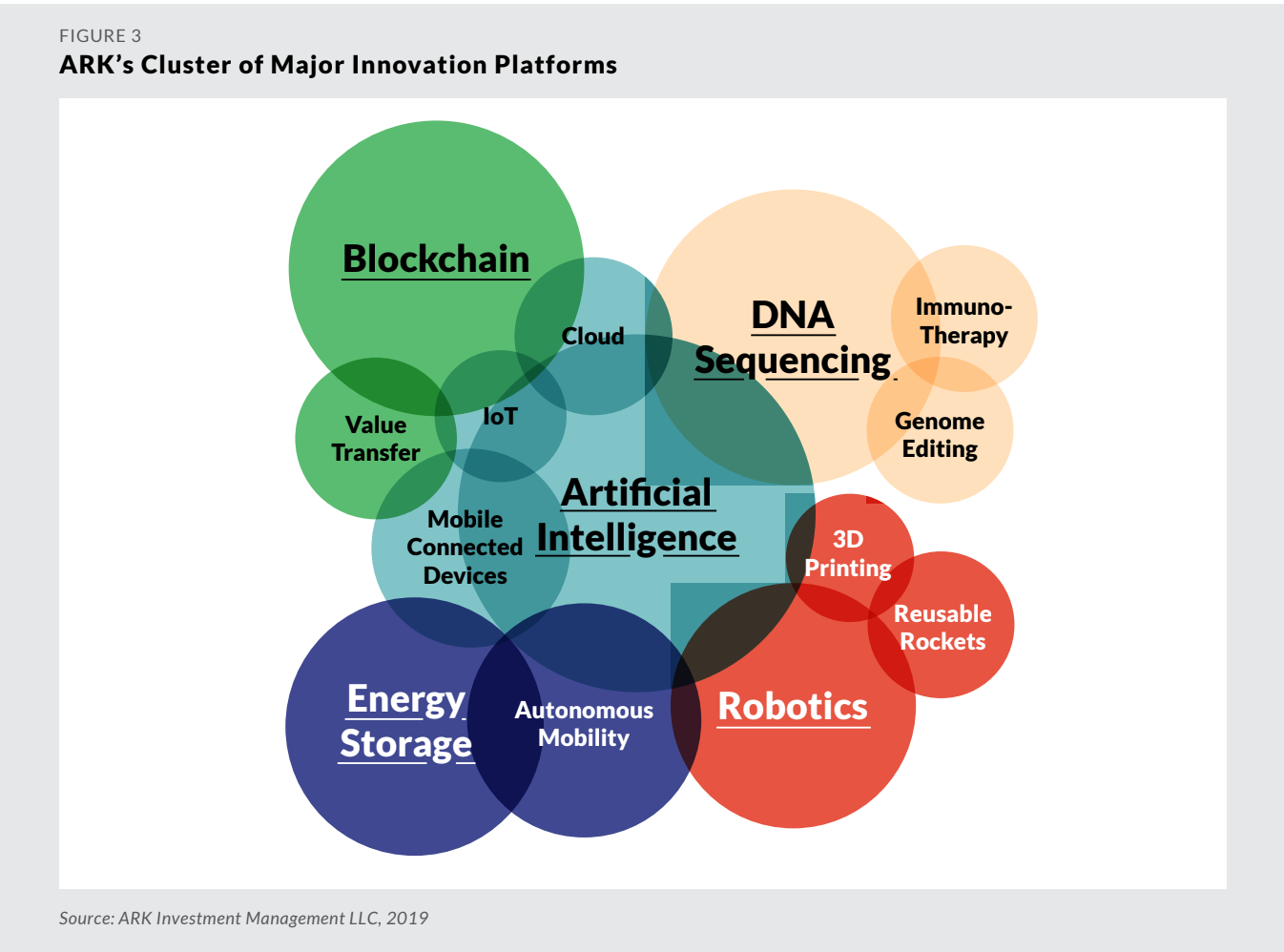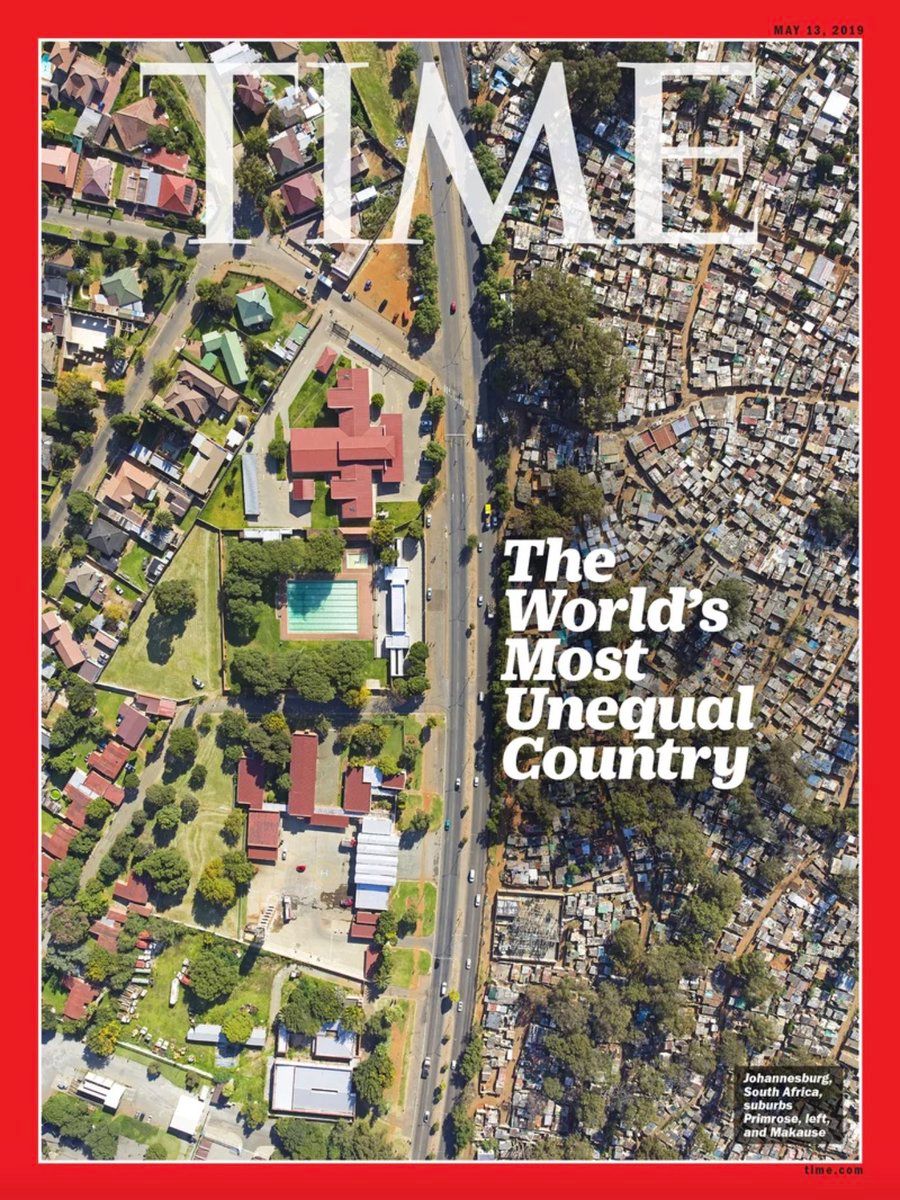
The 5 Laws of Exponentiality
We could say that the simplification of technology is one of the next great ‘mega-trends’: a global force exerting a massive impact on our societies, cultures, economies, businesses, and personal lives. It's time to include the disenfranchised and ensure no one is left behind.
Last week's Daily Maverick article on the falling cost of production of solar panels reminded me of the five laws of exponentiality! These are generally poorly understood and, like many so-called "Innovation Platforms" and the related advantages available for capital exploit, guarded so that the majority of people remain disenfranchised. This is especially relevant from a South African perspective, as outlined here...

The TIME image above is from 2019 but in 2022, according to another Daily Maverick article, "South Africa has once again topped the global charts on a dismal economic measurement. According to a new report by the World Bank, Inequality in Southern Africa, the rainbow nation is still the world’s most unequal country."
I've alluded to a movement in this article, to drive hope and common purpose, and it's clear that we have a lack of leadership whether from Government, Corporations or Civil Society the peoples experience of leadership remains that its self-serving and none of us trust each other, particularly across these organizational groupings.
These assertions are made primarily from a South African perspective, but I'm sure there are many global and universal truths. Let alone relying on the aforementioned organizational groupings as individuals, we shouldn't even rely on the UN 2030 agenda to be "Transforming our world: the 2030 Agenda for Sustainable Development." We need to claim individual agency and take action.
How might we act with hope and common purpose?
It starts with me and you, every one of us believing that there is hope and acting with a common purpose. Not self-serving purpose for selfish gain but an aligned purpose that is massively transformative. The possibilities are endless if we move away from a scarcity mindset to an abundance thinking. Scarcity, fear, uncertainty, and doubt are the fruit of the aforementioned organizational groupings. This to a lessor or greater extent depending on the degree of greed and narrow-mindedness.
This brings me to the five laws of exponentiality.
These "exponential secrets" and many contrary fallacies that perpetuate digital and financial exclusion are kept secret from the common man in order to break trust and steer us away from a common purpose.
Common purpose starts with rejecting scarcity and embracing abundance, the 1st law of exponentiality.
The Law of Abundance is an abiding principle within universal laws. It is the simple fact that there is an unlimited Source of everything we need or could ever want. This great abundance is already ours, infinitely available to all of us all the time.
Now we can be philosophical and debate this. We can reject it as mumbo jumbo, or we can open our minds to the belief and possibility that our God-given potential and the abundant resources of the universe are accessible to everyone. One of my favorite examples is what Fabrice TESTA, founder of Maana Electric is doing in the renewable energy space with sand. That's right "sand" is an abundant and cheap resource.
His LinkedIn profile elaborates, "We are using space in-situ resources utilization technologies and automated industrial processes in order to turn sand (from deserts) into solar panels at a fraction of the cost of industry standard." Finally, the trigger link to the first DM article I quoted above. So with abundance thinking, the possibilities really are endless, and this leads to the next law of exponentiality, production is increasing, and the cost is declining, as the solar panel article above suggests.
The 2nd law of exponentiality - for every cumulative doubling of units produced, costs will fall by a constant percentage.
Measured over the decade to 2015, ARK found that a price forecast based on Wright’s Law was 40% more accurate than one based on Moore’s Law.
Pioneered by Theodore Wright in 1936, Wright’s Law aims to provide a reliable framework for forecasting cost declines as a function of cumulative production. Specifically, it states that for every cumulative doubling of units produced, costs will fall by a constant percentage. I first came across Wrights Law from Catherine Wood, the founder of ARK Investment Management LLC, when she came to the Singularity South Africa Summit. In researching this and working with OpenExO came across Jeff Booth. My favorite article from him is "The Greatest Game," which expounds on the deflationary effects of technology, along with his book The Price of Tomorrow, In reality, production costs are falling dramatically, but they're artificially inflated to maintain corporate profits.
The 3rd law of exponentiality Moore’s Law focuses on cost as a function of time.
Named after Gordon Moore for his work in 1965 – Moore's law focuses on cost as a function of time. Specifically, it states that the number of transistors on a chip would double every two years. Wright’s Law, on the other hand, forecasts cost as a function of units produced.
The 4th law of exponentiality is Kurzweils law of accelerating returns.
Ray Kurzweil postulates The Law of Accelerating Returns, according to which the rate of change in a wide variety of evolutionary systems (including but not limited to the growth of technologies) tends to increase exponentially. Moore indicated doubling capacity and output every two years, but in reality, we're seeing the time to doubling reducing as technology advances.
One of the best illustrations of increasing exponentiality is from ARK Investment Management LLC Big Ideas 2019, which illustrated the cumulative effect and impact of exponential technologies from about 2017. Notice how there is a dip below the timeline, similar to what happened in 1780 when people thought that horses and carts would persist as the dominant mode of distribution of goods until the emergence of the steam engine. Along this timeline, each new technology emerges many years apart but since the 2000's many exponential technologies are maturing simultaneously, and the benefits are accruing across industries simultaneously.

But there's a catch, and I believe that, to a large extent, it's by design. The masses are kept in the dark and fed with scarcity thinking, fear, uncertainty, and doubt in order to control them.
The catch is illustrated by Martec's law which empahsises organisational resistance to change.
Martec's law states that "technology changes exponentially, but organizations change logarithmically and slowly over time." It is said that as the gap between technology innovation and organizational adoption widens over time and at some point, a reset within the organization is required.
The aforementioned organizational groupings, especially corporations and politicians, resist change and the power of exponentiality to serve their own greed and perpetuate self-serving behaviors, systems, and the continued disenfranchisement of the masses. This is why when Covid hit, we decided it was critical to do whatever we possibly could to Democratise Entrepreneurship. At ExoFutures we looked at the generally available Entrepreneurship training and education and found that the "fundamentals" are missing, such as how the mindset of the entrepreneur is different and how to tap into abundance. We created knowledge nuggets as a way to provide easy-to-consume and digestible entry-level content to anyone with limited access to formal education. Much of the mainstream material had merely dusted off an MBA and added the latest Entrepreneurial practices and methods such as Lean Startup, Google Sprints, Design Thinking, and Fail Fast.
In reality the main benefit of technology is simplification, efficiency and effectiveness not increased complexity.
“The world, made complex by technology, was becoming simple again, its technology hidden deeply behind the face of reality.”
These words from science fiction author Cixin Liu perfectly express the coming era of technology: radical simplicity.
In fact, we could say that the simplification of technology is one of the next great ‘mega-trends’: a global force exerting a massive impact on our societies, cultures, economies, businesses, and personal lives.
It's time to include the disenfranchised and ensure that no one is left behind.
While this is useful for anyone that has a degree, it's still largely exclusionary for the masses, and the fundamentals are inaccessible to the disenfranchised. There are certainly exceptions to traditional thinking and practices, notably OpenExO and the Exponential Transformation playbook based on the book by Salim Ismail Exponential Organisations. Version two is due to launch imminently!
Now for the critical importance of aligning people on a common purpose and their intent to share value in their communities and ecosystems at large.
The 5th law of exponentiality is the law of network effects as defined by Metcalf.
Metcalfe's Law states that a network's impact is the square of the number of nodes in the network. For example, if a network has ten nodes, its inherent value is 100 (10 * 10). The end nodes can be computers, servers, and/or connecting users. Here's an example from one of my favorite proponents Raoul Pal :

Human connection, family units, and communities with an aligned purpose are an essential ingredient to change and create the future we want. We must not only hope. We must connect and align on purpose. We must join a movement for a common purpose.
In 2021 I wrote a manifesto asking, "Is Africa running out of time?" in a similar vein. This included a feedback form which hardly got any response. A lot has happened in the last two years, and I'm more determined than ever to orchestrate impact ecosystems for inclusive exponential growth to create jobs, accelerate digital and financial inclusion and transform communities at scale!
Have we got to the point where each of us will claim agency, take accountability and unite with a common purpose to build South Africa and our world for a common purpose, transforming livelihoods in and creating opportunities for prosperity at scale?

ExO Insight Newsletter
Join the newsletter to receive the latest updates in your inbox.









